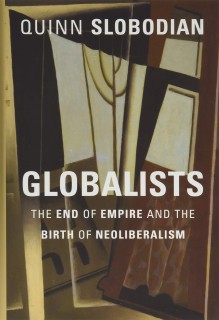"Globalists: The End of Empire and the Birth of Neoliberalism" (2018) by Slobodian (Harvard Press) is a detailed history of the people and ideas neoliberalism, and the institutions they created. The book is historical and delved into the deep end. One reflection, which is somewhat counter intuitive, is that neoliberals are not opposed to government or regulation, just certain types. In fact, they are very pro certain types of governance / law / regulation, such as protecting private capital internationally (which requires clear and strong international law). A few quotes:
"If we place too much emphasis on the category of market fundamentalism, we will fail to notice that the real focus of neoliberal proposals is not on the market per se but on redesigning states, laws, and other institutions to protect the market." (p. 6)
"Hayek himself was explicit that the international power needed "an authority capable of enforcing [the] rules." Although after the war Hayek swerved away from engagement with international order, other neoliberals did not. As we will see, neoliberals argued against adding social and economic rights to the basic list of negative rights, even as they made the case for economic rights of their own - above all, the right to keep foreign investment safe and to move capital freely over borders. Like Hayek, they focused on the expropriation of foreign-owned property and controls on capital movements as being the central violations of rights. They would help design institutions that would safeguard the "negative rights" of freedom from expropriation and capital control." (p. 123)
"Other neoliberal thinkers downplayed the centrality of culture and race after 1945, but Ropke insisted on its importance. "Racial fanaticism," he wrote in 1965, "does not justify denying that there is something called ethnos, race, and it is elementary importance." The literature he footnoted was stark in its hierarchical biological essentialism. Among his recommendations for the field of "ethnopsychology" was a study that concluded that "mental capacity tends to be adequate among peoples and races adjusted to cold and temperate climates but inadequate among those adjusted to hot climates" and warned of "lethal power in the hands of nation-states dominated by populations incapable of rational thought." At a time when biological race was being either marginalized or recorded for many of the social sciences, Ropke brought it to the center of his analysis." (p. 157)
"Scholars often use overly broad characterizations of Global South countries as adherents to the ideology of dependency theory, which supposedly privileged the protection of infant industry above all else to diversify the economy. In that narration, the exceptions are those countries with especially close ties to the United States - Japan, Taiwan, and South Korea - whose export-oriented industrialization models are usually seen as prefiguring the direction in which development would go once the third world snapped out of its dependency-theory-driven delusions. Looking at the response to the Haberler Report, one sees that the truth is less black-and-white. In fact, developing countries were advocates of both protection and liberalization at the same time. They followed a policy of "both-and" rather than "either-or"." (p. 202)

